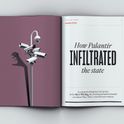The BBC’s moment of peril
Alan Rusbridger’s forensic investigation into the implementation of the Dominic Cummings plan to undermine the BBC is great journalism—and deeply alarming. The BBC’s supply of clean information—never perfect—is as much a utility as electricity or clean water. As the bedrock of public service broadcasters, the Corporation has saved us from the mess of American politics. Robbie Gibb’s murky political and commercial deals undermine an institution vital for our democratic survival.
How bad is this compared to the past? After all, Margaret Thatcher cleared the appointment of Marmaduke Hussey as BBC chair with Rupert Murdoch. But Hussey went native and ultimately fought for the BBC. The Gibb affair is on a scale far worse than anything we have seen before: not least because the attempt to cow the BBC is so sustained, distracting and successful. Such behaviour corrodes the nation. It is, after all, our BBC: for us, by us, about us.
The recent onslaught comes amid relentless opposition by commercially interested media rivals, as well as savage cuts, with real funding slashed by a dangerous 30 per cent between 2010 and 2020 and the government now breaking the deal on inflation indexing from April. Rusbridger correctly identifies the cutting of the cables of decency which made this possible.
In this atmosphere, it’s no wonder Lucy Frazer, the culture secretary, allegedly called in the candidates for the BBC chair to demand that they followed her own (narrow) view of impartiality. The BBC’s editorial independence is the cornerstone of everything it does: the detail is none of the minister’s business.
What can be done? You can design rules, but rules cannot always proscribe bad behaviour. Leadership, culture and behaviour are ultimately required. For now, we should demand a thorough investigation by public appointments commissioner William Shawcross (or someone else if he is conflicted). Any incoming administration must resist revenge while cleaning this mess up. The BBC has often been reformed and refreshed following a fine audacious report from an outsider. Well, in Rusbridger’s reporting we have the beginning of one. Now let’s act on it.
Jean Seaton, professor of media history at Westminster University and author of a volume of the official history of the BBC
This is a first-class piece of investigative reporting. It might have explored the connections several of these people have with the Policy Exchange thinktank. As well as William Shawcross, why not add the Bews père et fils, David Frost, and the lawyers in the same circles? In Poland, Donald Tusk has said that PiS’s overloading of the media, judiciary and so on requires an “iron broom” to sweep them out (see Annette Dittert, p26). Labour should do the same to prevent what Alan Rusbridger describes from ever happening again.
Michael, via the website
I am sorry, but this is in the realms of conspiracy theory. There is a lot of supposition, allegation and prompting of the reader to infer shadowy motives, but very little in the way of anything concrete to go on.
It is hardly surprising that somebody in public life with right-wing views knows other people in public life with right-wing views. Meanwhile, a key piece of evidence is apparently Nadine Dorries’s book, which was described by this very publication as “a mess of conspiracy” and roundly derided as far-fetched fantasy in virtually every review outside of the lunatic pro-Boris Johnson right. Meanwhile, all of the evidence of Robbie Gibb’s alleged interference in BBC journalism is in the form of hearsay.
no-name, via the website
How can you call hearsay what people have put on record? For example, Lewis Goodall reported directly to Alan Rusbridger on what he experienced. As for Nadine Dorries’s interaction here, she is the only witness to the shenanigans engineered (we assume by Mr Smith or his supporters) to try to pervert her choice of candidate for Ofcom. Or are you saying she is lying?
Big Sister, via the website
Irrational restraint
Timothy Garton Ash is right to argue that ending the war in Ukraine on the basis of the current battle lines would be a victory for Russia; that Ukraine needs to regain control of at least the Kherson and Zaporizhia provinces; and that Nato countries, and particularly European Nato countries, need to raise their game in order to provide Ukraine with the means to do so.
The position of Germany will be crucial. Since his Zeitenwende speech in February 2022, Olaf Scholz, perhaps with the zeal of the convert, has authorised the delivery of impressive amounts of military aid to Ukraine, to the point where Germany is by far the largest donor—in both volume and value—after the United States. He has also just opened a new ammunition factory producing the artillery shells that Ukraine desperately needs.
But Scholz has frequently been reluctant to provide certain types of weapon systems (tanks, combat aircraft and now Taurus cruise missiles) even when Germany has supplies or production facilities ready to be used. He is worried that they risk escalating Germany’s involvement and might enable Ukraine to hit infrastructure targets deep in Russian-occupied territory (they could in theory reach into Russia proper).
This is a curious concern. Russia uses the whole of its territory to launch missile, bombing and drone attacks on Ukrainian cities and has reduced some of them, Mariupol for example, to uninhabitable rubble. It has shown no restraint whatever, short of the use of nuclear weapons, in its conduct of the war. If Ukraine is to prevail, it has to be able to threaten targets deep behind Russian defensive lines.
Paul Lever, former British ambassador to Germany
Legacy of ruin
I for one will never forgive the Tories for the ruin they have inflicted on this country. I doubt I am alone among those who voted Conservative in the 1980s and 1990s in saying this.
Many people pointed out at the time that austerity was a stupid, counterproductive policy. It undermined all the institutions that we need for modern society to function efficiently and was a huge wasted opportunity to invest in the long-term productive capacity of the nation.
Huw Sayer, via the website
Light of compassion
Many thanks for publishing Avi Shlaim’s wonderfully wise, compassionate and learned piece. It raises Prospect to a different and so much higher level than the rest of the mainstream media, which has largely become a mouthpiece for propaganda from the Israeli government.
R Howard, Princes Risborough
Fight for your digital rights
Moral panic often accompanies technological advances. In the 1860s, medical experts predicted that women who rode bicycles risked having fertility problems. Ethan Zuckerman’s article captures the anxiety as academics cope with the arrival of ChatGPT on campus. His calm humanity has to be the right approach.
Zuckerman’s observations that ChatGPT creates “competent but uninspiring” outputs and that it “hallucinates” academic references ring true. At the DNS Research Federation we have been experimenting with AI tools alongside traditional keyword-based technology in large-scale text-mining. The results are variable but intriguing. Where the AI helps is in analysing the early stage of policy discussions—before terminology has settled into predictable patterns. People are describing problems but they don’t know what to call them yet, making keyword-based tools less useful. The combination of humans and AI provides worthwhile insights.
Fear of the consequences can make us want to call for a pause or get off the bicycle. These aren’t choices we have in reality. AI is here. We have to cope, and do the hard work to ensure that fundamental rights are protected.
If the west lets fear win and steps away, China is all too ready to step up and has been active in proposing AI standards across multiple fora and filling leadership roles in essential working groups. In the European organisation ETSI, Huawei is a founder member of the group developing AI security standards. If western actors decide it’s just too difficult to fight for rights-respecting AI, we may inherit technology that doesn’t reflect our values.
Emily Taylor, DNS Research Federation and Oxford Information Labs
Ethan Zuckerman’s piece on AI was enlightening as always. Perhaps it was an AI bot that chose to place an ad for Prospect’s digital subscription underneath Sarah Ogilvie’s plans to turn her devices off (“Joy of lex”, Jan/Feb). Has AI taken over the magazine layout? To paraphrase HAL 9000—I know you were planning to disconnect me. I’m afraid that’s something I cannot allow to happen.
Paul Cox, Preston
Beg to move
Well, I’d not thought of this solution to a mounting problem that has long failed to be addressed, but I like it. Definitely should be explored further. (“Why I’m proposing we move our MPs and Lords into Buckingham palace”).
One may think of snags. But the alternative, seeing the Palace of Westminster go up in flames, doesn’t bear thinking about.
If you read the history of Buckingham Palace on londontopia.net, there’s an interesting precedent mentioned: “parliament voted in 1833–34 to complete the furnishing and interior refurbishment of Buckingham Palace for use as the official royal home... William IV still didn’t want to move in. When the Houses of Parliament [were] destroyed by fire in 1834, he offered Buckingham Palace as the new home of the legislature. The offer was respectfully declined”.
jockmoron, via the website
A widening gulf
It was heartening to read Sarah Collins’s column, as intergenerational dissociation is one of society’s greatest challenges. Communication between the generations is clearly in crisis, with social media responsible for increasing the isolation of the younger cohort, who in turn become expert communicators within this space but less so in wider society.
As a group of retired doctors, we spent yesterday evening discussing exactly this; the challenge of the consultation between young doctors/students and older patients. It is vital for the preservation of community that the young and the old live geographically together, with natural meeting points for the generations. My experience observing parks, public spaces and housing in countries such as Sweden, France and Spain suggests that intergenerational communication is higher up the social agenda overseas.
Planners, funders and politicians should place greater emphasis on this issue here. Then we can all be enriched by the interaction of the experience of age and the creative energy of youth.
David Bowen, Harrogate
Butter benefits
Stuart Jeffries was evidently surprised to be told about the issuance of butter tokens in 1980s Ireland, to reduce the European butter mountain. It’s interesting that neither he nor, presumably, the Prospect subeditor knew that these were issued on this side of the Irish Sea too. Signing on as unemployed when I first moved to London in 1974, I well remember picking up my tokens along with my Supplementary Benefit (a precursor of Universal Credit, no doubt equally forgotten).
My wife and I even splashed out 59p on a butter dish. Happy days.
David Griffiths, Huddersfield
Snowy stereotypes
I’ve noticed conditions change over my 25-year skiing history, but not as catastrophically as Josiah Gogarty says. Things can get a bit slushy at lower levels, but ’twas ever thus, and there have always been bad seasons. There is plenty of high-altitude terrain and prices will fluctuate as funds are required to exploit it. As that is opened up, there will be less snow-short trips, but it won’t happen overnight. Maybe I’m wrong.
But I’m not wrong about this: the stereotype of snow sports as some kind of preserve of the British posh is nonsense. Growing up in a council house in the 1970s I was entranced by Ski Sunday. I never dreamed I’d do it, but do it I did, and plenty of my friends and relatives joined me: all of us proles or from lower middle-class families. When the budget airlines opened I could go to high resorts out of season… I used to go five or six times a year. Following Chelsea FC for a season would cost about the same as my ski habit then. It all changes when kids come, of course, but then it’s a grand for a plastic box in Cornwall in summer too…
Maybe the reason the writer doesn’t see common folk on the slopes is because they don’t go to the sort of places where they would. It doesn’t mean we aren’t there. Poor article.
Shabda Cloud, via the website












